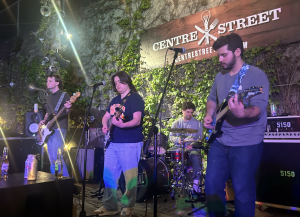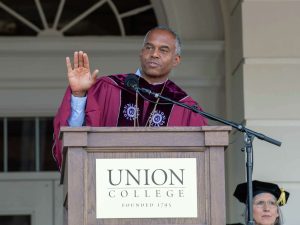The needed campus dialogue on NY State’s plastic bag ban
April 18, 2019
Plastic is not going away anytime soon but we need a radical change in our everyday use of it. After a single use, it is usually immediately disposed of and later found in streets, forests, oceans and aquatic life, which is becoming increasingly normalized. This is a critical problem and addressing it cannot be optional if we are to avoid even worse global crises in the coming years.
But in this short piece, I want to highlight New York State’s upcoming ban on plastic bags, create a community dialogue for campus action, and urge members and groups within the Union community to extend support to New York State’s ban and its leadership in sustainability.
New York lawmakers agreed within the past few weeks to impose this ban on most kinds of single-use plastic bags from retail sales. Governor Andrew M. Cuomo proposed the plan a year ago and New York would be following California’s lead with its similar ban by curbing the amount of plastic utilized and discarded each day.
The ban in New York is set to begin next March and will prevent stores from giving customers single-use plastic bags. The proposed plan would additionally allow counties to impose a 5-cent fee on paper bags where the revenue would go to both New York’s Environmental Protection Fund and another fund established to buy reusable bags for those in need.
Governor Cuomo has commented that this plan is to “protect our natural resources for future generations of New Yorkers.”
Both Democrats and Republicans are split on this ban. Assemblyman Phil Steck, D-Colonie, and Assemblywoman Patricia Fahy, D-Albany, are among those who firmly support the ban because of the threat plastic poses to the environment.
However, numerous local New York State lawmakers have criticized this new policy, including State Senator Jim Tedisco ’72, R-Glenville, and Assemblyman Angelo Santabarbara, D-Rotterdam. They argue the ban would have unfair implications on the consumers and local governments largely by restricting the choices of consumers with the new tax and gradually increasing their financial burdens.
This is an ongoing issue in New York State and I would like to further involve Union into the conversation by bringing the debate onto the Union campus. For instance, Union College President David R. Harris recently wrote an article in Inside Higher Ed titled, “A Campus Is Not the Place for Free Speech,” in response to President Trump’s executive order on campus free speech. President Harris argues for constructive engagement on campuses instead of free speech where colleges must seek more than free speech on their campuses and build dialogues. He states, “It is not enough for individuals to speak freely. We must also find myriad ways to put a range of views into conversation with one another.” Success is measured by the number of individuals “who understand, and perhaps even reconsider or change their views as a result of the experience, regardless of the direction of change.” Union has since launched an initiative on the campus to establish the settings necessary for understanding and learning from diverse perspectives.
It is in the spirit of this emphasis on constructive engagement that I encourage all members of the Union community to similarly write pieces in the Concordiensis expressing their views on this matter.
I would also like to extend the open invitation to New York State lawmakers and those running in local elections to present their positions to the community and Schenectady in the upcoming months. The proposed ban will impact all residents in New York State and so this conversation is both necessary and productive in understanding where our divisions lie and the arguments and concerns of both sides.
Schenectady Mayor Gary McCarthy is currently in the process of making a decision on what courses of action the City of Schenectady will take in the coming months and so I also welcome him to join this community conversation on the future of New York.
Union prides itself on its centuries of preparing members of the community to address the hardest problems of the age and curbing the effects of climate change is undeniably one of the largest challenges current students must face in the 21st century. This plastic bag ban and similar major steps in sustainability are part of the solution that need to happen right now.
The widespread use of plastic bags is not sustainable and the environment takes a hit every day they are produced and distributed. Alternative methods of shopping are available to consumers and they must be explored.
However, this ban most definitely has its issues, so a community dialogue both on and off campus is essential to taking immediate action towards the solution and planning for and minimizing all inevitable consequences of the necessary steps.
And who knows? Maybe this ban is not part of the solution. But I believe it is. So argue against me, prove me wrong, I really do not mind, as long as we quickly start moving in the right direction.
I will leave it here to the community to decide what is right. Should we stick with the same old and see what happens, or should we choose to take bold steps and start building a better future for those who come after us?






